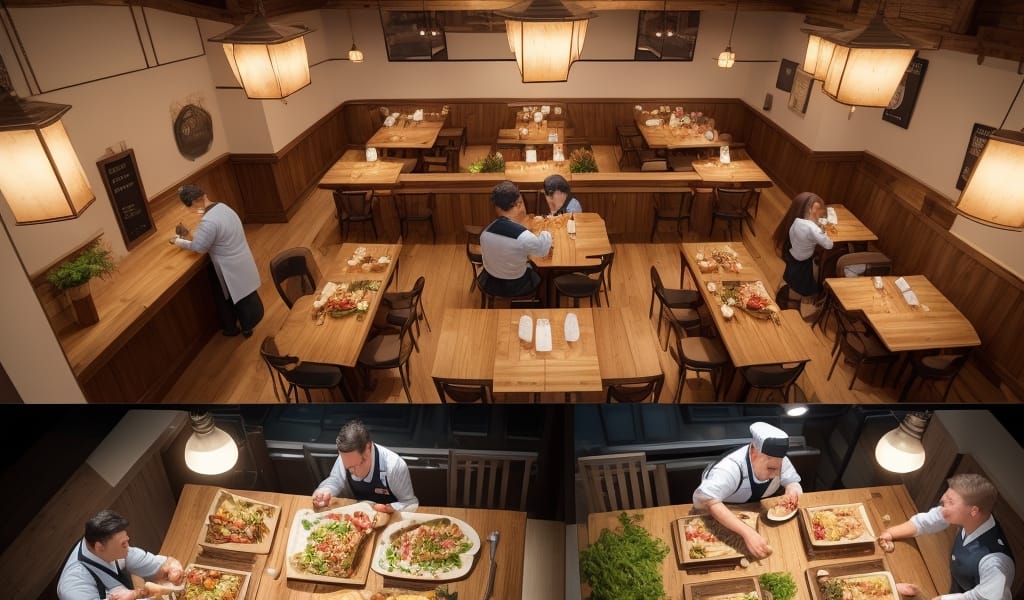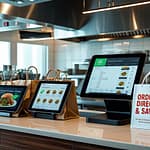Key Takeaways:
- Evaluate your resources and capacity before deciding on a franchise or independent growth path for your restaurant.
- Consider franchising if you want to replicate a proven business model and reduce the risk of failure.
- Opt for independent growth if you prefer having full control over your restaurant’s branding, menu, and operations.
- Assess the financial implications of both options, taking into account franchising fees versus the cost of scaling independently.
- Regularly review and adapt your chosen business model to ensure it continues to align with your restaurant’s goals and market conditions.
Franchise or Scale Independently? Pros & Cons
Should you franchise or grow independently?
As a restaurant owner, deciding how to expand your successful restaurant can be both exciting and daunting. One critical decision is whether to adopt a restaurant franchise model or pursue independent growth. Each business model comes with unique advantages and challenges, and the right choice depends heavily on your specific goals, resources, and vision for the future.
This article explores the pros and cons of franchising versus scaling independently, providing you with practical insights and real-world examples to help you make an informed decision.
Understanding the Two Business Models
Restaurant Franchise Model
A restaurant franchise involves granting franchisees the rights to operate under your established brand, leveraging your proven business model, menu, marketing strategies, and operational procedures in exchange for franchise fees and ongoing royalties.
Independent Growth Model
Scaling independently means opening and managing multiple restaurant locations yourself or through your own company, retaining full control over operations, branding, and strategic decisions without relying on external franchisees.
Pros and Cons of Restaurant Franchising
Advantages of Franchising Your Restaurant
- Rapid Expansion: Franchising can allow your brand to grow quickly with minimal capital investment from your end, as franchisees invest their own resources into opening new locations.
- Reduced Financial Risk: Franchisees assume much of the financial risk associated with opening and operating new locations, protecting your core business from excessive financial exposure.
- Shared Operational Costs: Franchisees typically handle day-to-day operations of their own units, reducing your burden of management and overhead costs.
- Enhanced Brand Recognition: Rapid expansion through franchising can quickly elevate your brand visibility, potentially increasing market presence and customer awareness.
Disadvantages of Franchising Your Restaurant
- Reduced Control: Franchisees operate independently, meaning you may have less direct oversight over operational consistency and quality control.
- Complexity and Legal Responsibilities: Franchising involves intricate legal agreements and regulatory compliance, requiring ongoing legal support and administrative management.
- Brand Risks: Poorly managed franchise locations can negatively impact your overall brand reputation, affecting customer perceptions even at well-run units.
- Slower Innovation: Implementing menu changes, branding updates, or new operational procedures can be more challenging and slower across franchise units due to contractual obligations and franchisee buy-in.
Pros and Cons of Independent Growth
Advantages of Scaling Independently
- Full Operational Control: Independent growth allows you to maintain complete control over operations, ensuring consistent quality, customer experience, and brand identity across all locations.
- Flexibility and Agility: Without franchise agreements, you can quickly adapt your menu, marketing strategies, and operational procedures to market demands and trends, keeping your brand innovative and competitive.
- Increased Profitability per Unit: Without paying royalties or franchise fees, profits from each location are fully retained, potentially increasing your overall profitability.
- Stronger Brand Consistency: Directly managing each unit allows you to enforce strict quality standards, maintaining a consistent brand experience for customers across all locations.
Disadvantages of Scaling Independently
- Greater Financial Risk: Expanding independently requires significant upfront capital investment, often involving substantial financial risk and liabilities.
- Slower Expansion: Independently managing each new location limits your speed of growth, as opening each restaurant requires dedicated resources, time, and management attention.
- Higher Management Burden: Expanding independently means dealing directly with staffing, training, and daily operational issues at every location, requiring significant managerial resources and expertise.
- Limited Market Presence: Slower growth can limit brand visibility and market penetration, potentially allowing competitors to gain ground faster through franchising or other expansion methods.
Real-World Examples and Case Studies
Successful Franchise Example: McDonald’s
McDonald’s is perhaps the most iconic example of successful franchising. By franchising early in their growth, McDonald’s rapidly expanded globally, leveraging franchisee investments and local market knowledge. The franchise model allowed them to establish global brand recognition, standardize operations, and achieve economies of scale quickly and efficiently.
Independent Growth Success Story: Shake Shack
Shake Shack represents a successful independent growth model. Rather than franchise aggressively, Shake Shack chose to maintain control over their brand and operations, carefully selecting locations and ensuring consistent quality. This strategy has resulted in high profitability per unit and strong brand loyalty, though expansion has occurred at a more deliberate pace compared to franchised competitors.
Choosing the Right Model for Your Restaurant
Consider Your Goals and Vision
Start by clarifying your long-term goals and vision for your restaurant. If rapid nationwide or international expansion is a priority and you are comfortable relinquishing some control, franchising may be an ideal choice. Conversely, if maintaining strict operational control, brand consistency, and innovation flexibility are your priorities, independent growth may align better with your objectives.
Assess Your Financial and Operational Resources
Consider your current financial resources, operational infrastructure, and management bandwidth. Franchising requires less upfront capital but demands a robust support system, legal expertise, and franchisee training programs. Independent growth requires substantial financial investment but gives you greater control and flexibility.
Evaluate Your Brand and Market Position
Reflect on your current brand strength and market position. Strong, well-established brands with easily replicable business models may be better suited for franchising. Unique, niche, or high-end restaurant concepts may benefit more from independent growth to maintain quality and brand exclusivity.
Seek Professional Advice
Before making your decision, consult industry experts, franchise consultants, legal advisors, and financial professionals. Their expertise can help you thoroughly understand the implications, costs, and benefits of each growth strategy, ensuring your choice aligns closely with your business goals and vision.
Conclusion
Deciding whether to franchise or scale your restaurant independently involves careful consideration of your business model, resources, vision, and brand positioning. Franchising offers rapid expansion, reduced financial risk, and shared operational responsibilities, while independent growth provides complete control, consistency, and flexibility at the expense of higher financial risk and slower expansion.
By carefully evaluating the pros and cons, consulting industry professionals, and learning from real-world examples, you can select the expansion strategy that best supports your restaurant’s long-term success and sustainability.






Comments
Be the first to comment on this article.